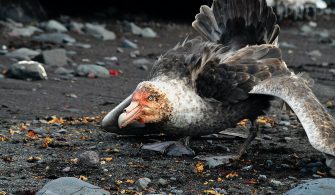Earth’s climate has never been stable, it naturally evolves. Current global warming is unique because it is a direct consequence of human pollution. We can even now say that the 6th mass extinction has already started and can also be called as Anthropocene extinction because it is human-derived (Vaughan,2016). Effects of climate change on human populations in 2100 will be global and nowhere will be safe to live in if we do not adapt to the new conditions. Biodiversity in 2100 can be drastically reduced and most of the organisms go extinct. Extinction can be caused by sudden habitat loss, natural disasters, and a scarce amount of nutrition due to climate change. Loss of biodiversity means not only the organism which went extinct will be affected but other organisms that are linked to are in danger too. Despite all these negative results of climate change, conservation biology can reduce the risks of biodiversity loss by enhancing their works and range of study in the future. Maybe even conservation biology protects the endangered species very well and reproduces them. But biodiversity loss won’t be the only problem in 2100. Nature’s balance will be broken in a way that maybe there will be no solution to stop it. Because nature is all about a balance between organisms, habitats, and abiotic and biotic factors; it can be thought like a chair with 4 legs. Without one of the legs, the chair won’t be able to stand up like it used to. Therefore, agricultural productivity and the human population will experience the consequences very closely.
Agricultural productivity and human population are closely linked to each other since humankind settled down. Our lives simply depend on agriculture and water resources. Due to extreme weather conditions like droughts and floods, agricultural productivity will be reduced. Resulting in human population migration to cities, not because of economic reasons but climate change (Joerji 2021). Also, people will compete for scarce resources, and deaths caused by fewer resources, new epidemics or pandemics, and malnutrition will increase. Climate change will not only affect humans or ecology but as sociologically our everyday lives. In general human population can be increased by over 7 billion but death rates will increase due to climate change. It can be said that humankind will suffer from extinction too.
I think there can be a possibility that climate change might be natural. Homo sapiens is a specie that survived disasters and challenging environments because of its ability to survive. Maybe climate change is a natural flow in the world that must happen. We caused climate change, but we are also animals that can make mistakes and put the world in this situation. People will eventually adapt but it will take a long time after 2100. Therefore, I think there are solutions to the unwanted effects of climate change on human populations. Using solar energy production caused by an increased rate of solar radiation (Jebeile, 2021) can decrease the rate of pollution caused by the energy industry. Also, we can use higher altitudes as new agricultural places. Because climate change occurs more rapidly in mountains higher altitudes can become new productive agricultural spaces for us (Azadi,2021).
Lastly, in 2100 future does not seem bright but with the right cautions and strategies in conservation biology, we can reduce the risks of climate change. Also, we can use climate for our good like using solar radiation and new agricultural methods while adapting to the changes. I believe that humankind will have the ability and survive in most of the conditions and scarce resources in 2100.




